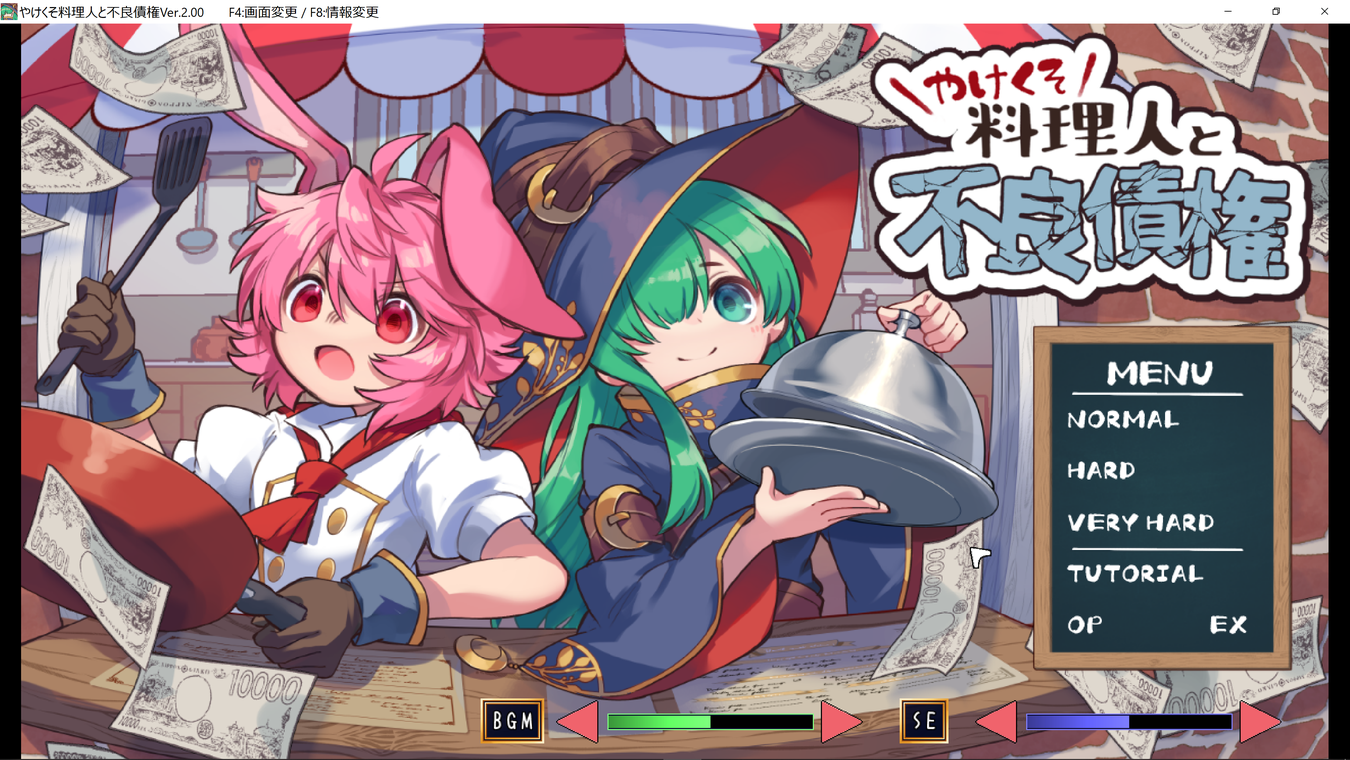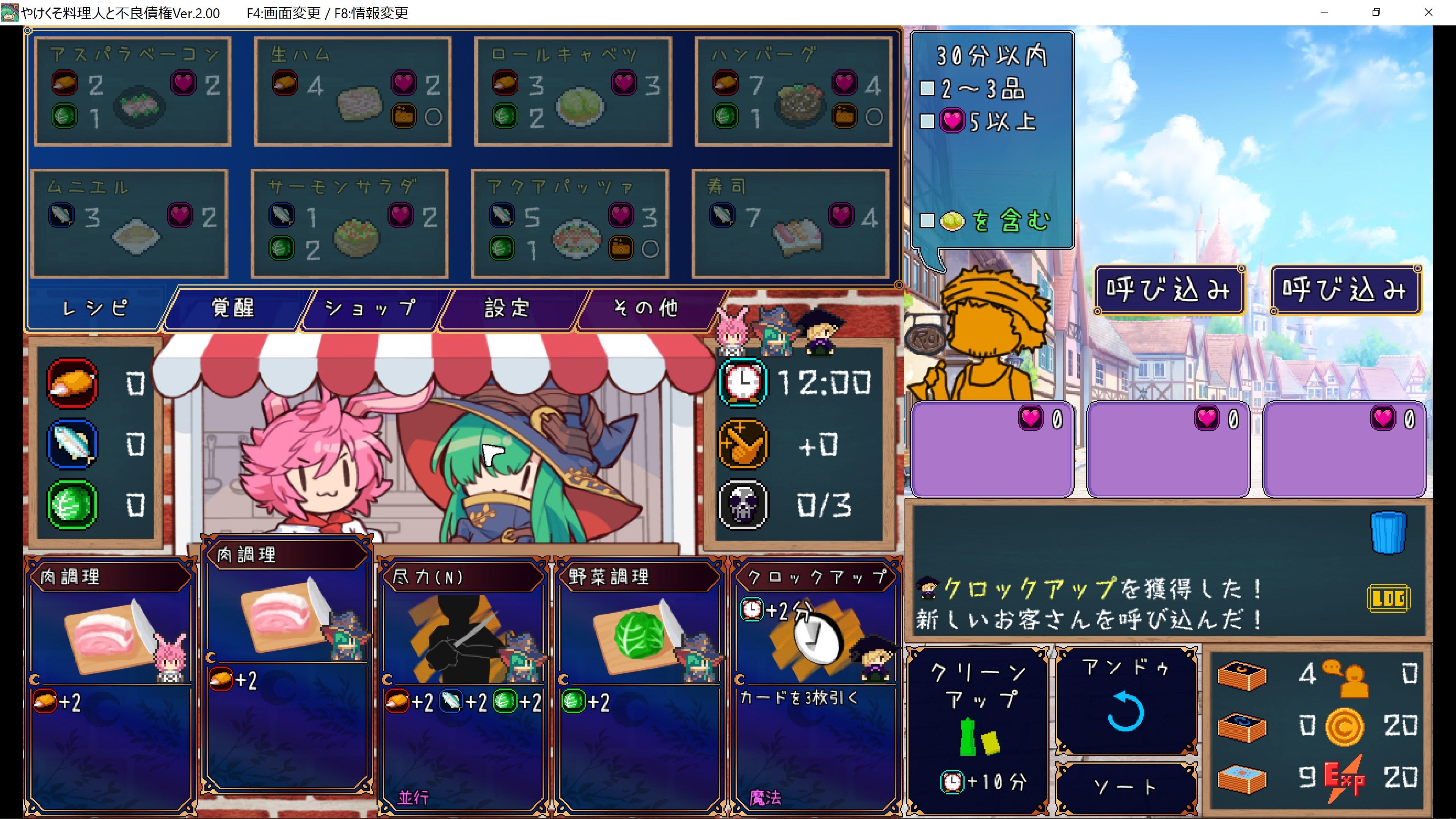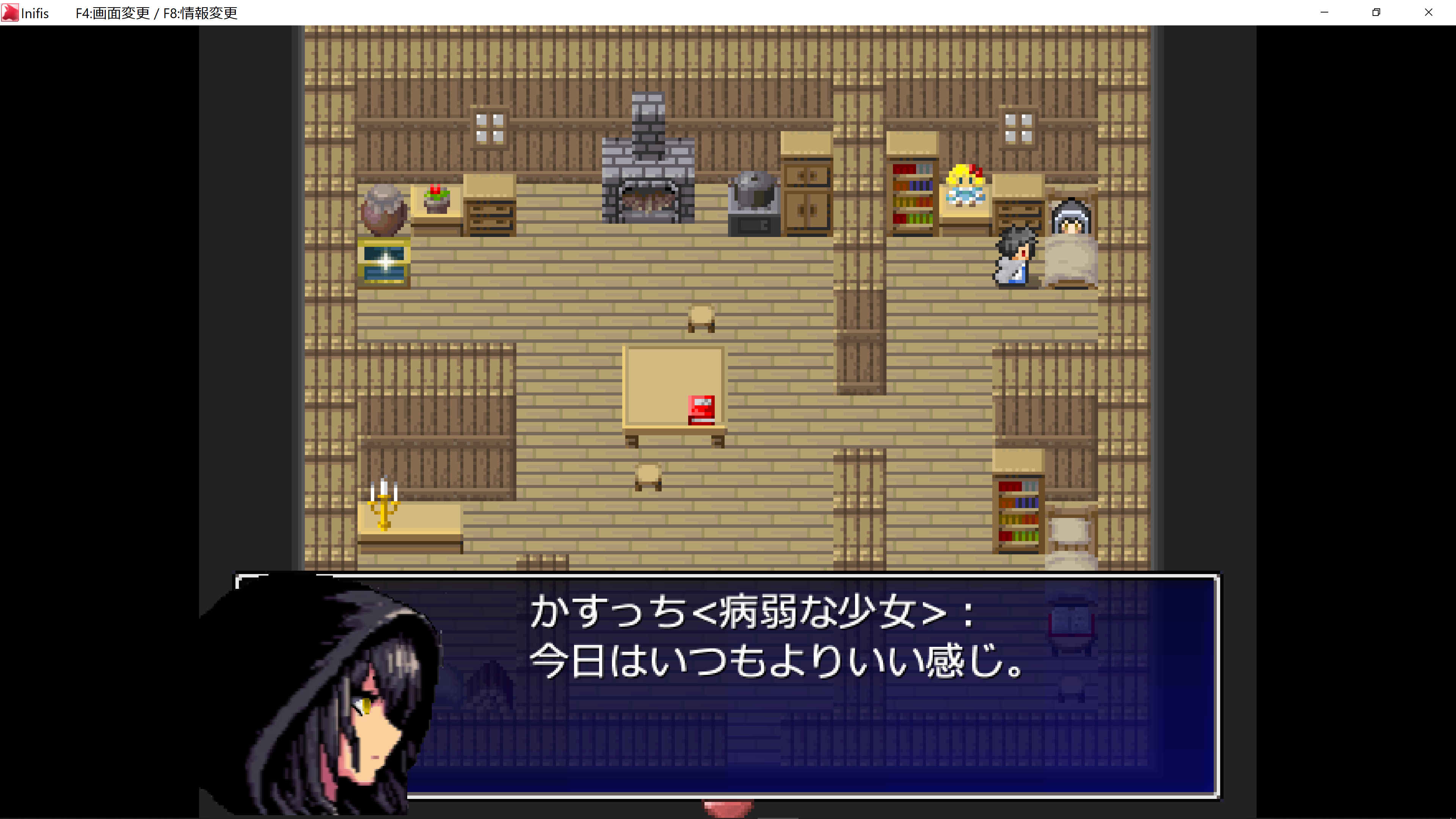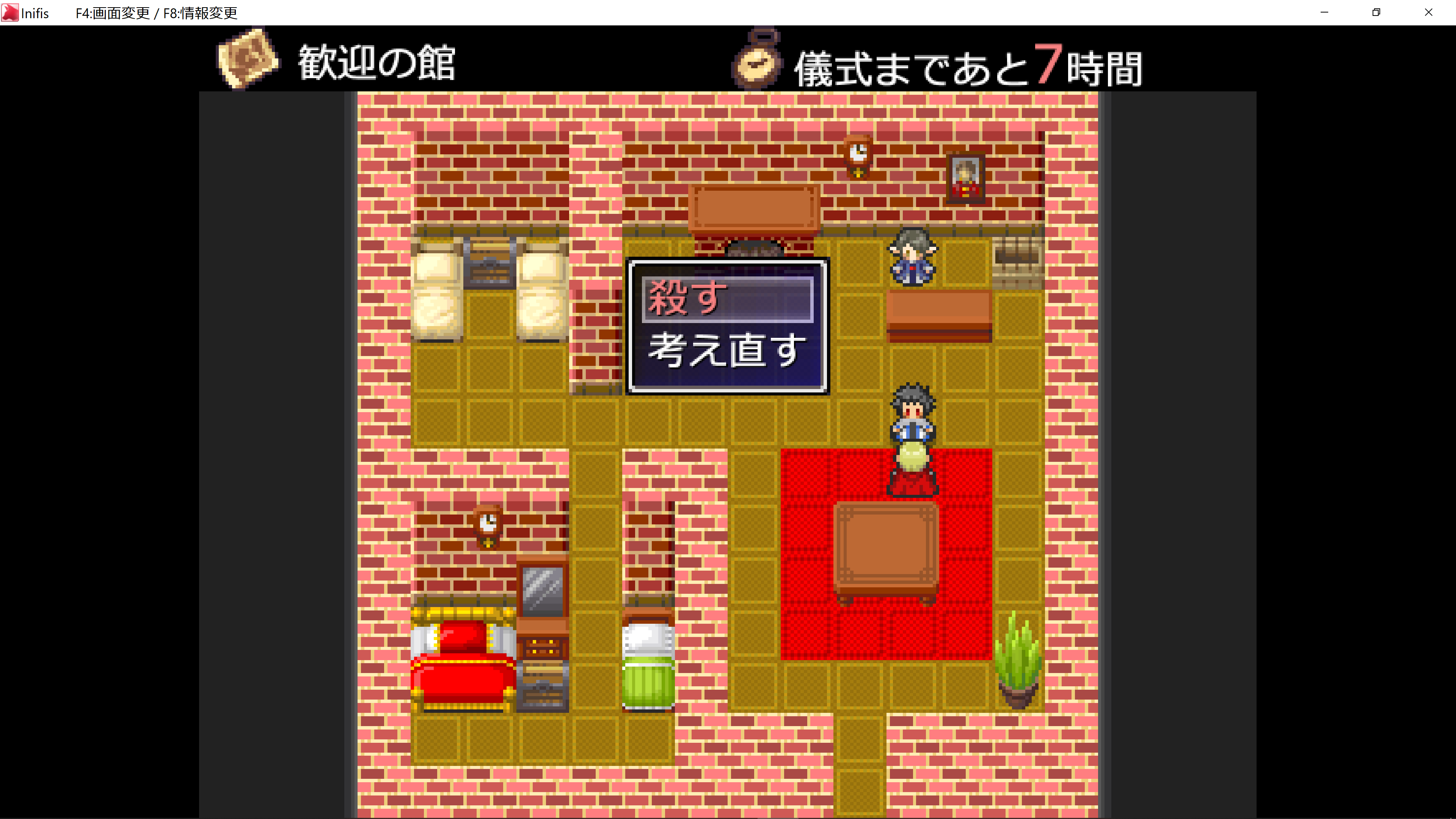The 16Th Wolf RPG Editor Contest (第16回ウディコン) やけくそ料理人と不良債権 (#61) And Inifis (#14)
30 7月 2024

More Wolf RPG Editor Contest games coming your way, this time cooking and saving your little sister from becoming the vessel of a god-like figure.
やけくそ料理人と不良債権 (#61)
Romaji Title: Yakekuso Ryouri Hito to Furyou Saiken
This is a deckbuilder roguelike where you cook, cook, and cook. The protagonists must set up shop and cook their way to first place in the festival, or their debts will catch up with them.
Your starting deck is always the same. Several cards that increase the amount of resources (chicken, fish, and vegetables) that help you cook certain dishes for your customers. Most of the cards are also linked to a member of the kitchen: unless it's a card that says otherwise, the card "uses up" the member until the deck is refreshed. Any resources accumulated during the turn are wasted when the deck is refreshed, and the clock advances a few minutes. This is the only way to cook more food after you have used up all the cards you can use in a turn.
Along the way, players can choose to recruit friends to bring their expertise and cards to the table, or to improve their current recipes. They can also use the shops to buy new cards and upgrades, or use their accumulated exp as a get-out-of-jail card to buy resources in a pinch. As the popularity of the food stand grows, more and more customers are asking for more difficult orders.

The player must reach at least 100 popularity before three strikes and the clock reaches 18:00. After that, the player must satisfy all three customers with the pickiest orders possible to beat the game.
As you can see, this is a very demanding but fun game. Every turn is valuable: you want to use as many resources as possible to satisfy as many customers as possible in one turn, and this requires a lot of strategy. In one Normal Difficulty run I had, I got all the way to the final stage only to get terrible cards that wouldn't let me serve one of the easier dishes to the last customer and game over. It was exhausting to fail at the last second, but it also taught me to make sure my deck was concise and actually useful.
I'm not particularly good at this game, but I enjoyed learning how to play the game and controlling the flow of customers and resources. I can see this being a hit for folks who like games like Balatro if this game is translated. The sessions are long (30 minutes) but very satisfying once you get into the rhythm of the game.
やけくそ料理人と不良債権 is a game that I keep returning to. I still can't beat anything harder than Normal, but that doesn't mean I won't keep trying. The characters are cute, the music is lovely, and the gameplay is easy to pick up and play. I can't wait to play it again and see how far I can get.
Inifis (#14)

When I was given the prompt to name a cute girl, I entered my usual Japanese name, Kasucchi. It turns out that I am the sickly little sister of the player character who has now been chosen to be the vessel of a god.
The player character, a priest, wants to betray his church and save her from this terrible fate. He only has eight hours to lead her to safety. There are several paths the player can take to accomplish or fail this task. Taking out a few guards and securing an escape route might be a viable option. Or the player might want to draw the blade to silence eyewitnesses. Whichever ending they choose, the player will return to a room full of unlit candles, representing the many endings they haven't seen. They can return to the Inifis world and replay the game, carrying over their stats and most of their items.
In this way, the player is encouraged to repeat the gameplay loop, to learn all the secrets of the setting, and to tweak their route in order to reach an ending that satisfies their curiosity. Battles and puzzles become easier once you find the shortcuts and items that make them easier. You know exactly where to go to get the ending you're after. It's very satisfying to master the game's structure and reach an ending without really thinking about it after a few minutes of pointless play.
It's not accurate to call the game a sandbox title, but I keep thinking of it that way because there is no right ending. There are two endings that can be considered "true" endings (and are treated as such by the developer as admitted in the omake room), but they are not mandatory. The player can feel fulfilled by completing one ending and never playing the game again. I haven't done all the endings myself (I'm missing about three), and I still feel like I have a complete picture of what the game is about.

Instead, the game is more about uncovering the small details of the setting that led to the unfortunate event and the actions the player will take. As the player tries to see as many endings as possible, they will inevitably discover some of the more disturbing facts behind the premise and realize how little these events matter in the larger scheme of things. Ultimately, this is a story about sibling love in a dark fantasy world. No matter what truths are revealed, how many characters the player character kills, whether or not the sister is saved, etc., I was left with a feeling of hopelessness.
I wasn't sure what I was doing when I started killing innocent people or stopping the ritual. Was saving Kasucchi all that necessary? I know the ending where you do nothing sucks, but I wonder if it was still the best ending. After thinking about the player character's motivation and why he did what he did, I just think it's a tragedy that it had to turn out that way.
The truth behind the final moments of the game stays with me. I was impressed by how short the game is (2-3 hours), and yet it felt like I was watching a massive setting unfold before me. It's clear how much this game is inspired by Fanastasis (confirmed by the developer in the omake room), and it's doubly impressive how it uses a similar structure and setting to condense a rich experience into such a short and intense experience.
I would even go so far as to say that this title should be considered one of the most impressive fantasy furige because of its brevity. Yes, there are titles like Tobira no Densetsu that impress players with their scope. But the innovative structure, the themes of religion and JRPG storytelling, its methodical approach to reusing stock assets, and a fully fleshed-out setting that plays out in a three-hour game is incredible to say the least.
I felt lost on a journey as I found mysterious secrets that remain unexplained to me, fought villains who are really minor villains in a larger story, and imagined the larger world beyond the small town of Inifis. What happens out there? The little I know about the setting makes it oh so tantalizing.
Inifis is a highly recommended title. It is the kind of dark fantasy title that I adore in the furige world, and it makes for a great introduction to the world of furige. I would love to see people pick it up and realize how incredible furige actually is.
Phew, that took a while: writing about two different fantasy titles that represent the wide spectrum of furige is pretty exhausting! But I hope these two titles, especially Inifis, make people curious about this wild and interesting world.
As always, feedback and recommendations are welcome!